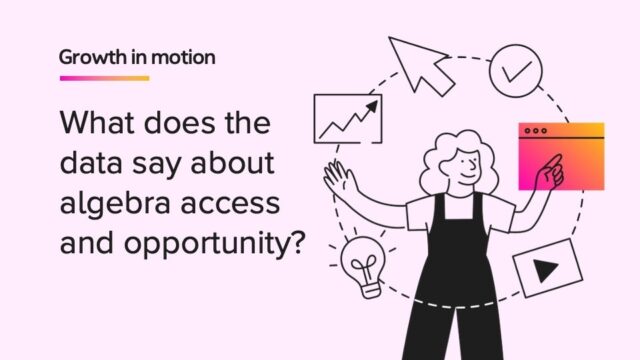
Regardless of when you went to school, you probably recall math classes that followed a format very similar to the following scenario:
- Teacher goes over last night’s homework.
- Teacher shows students how to solve a new problem.
- Students solve a bunch of problems in the exact same format that the teacher just did.
- Teacher assigns homework, typically a worksheet.
In many cases, most of the homework consists of more of those exact same types of problems, except for possibly one problem. That one problem requires a higher level of thinking that was never part of any lesson. Maybe during class, you were allowed to work with a partner if there was time to start the homework. Otherwise, math was taught as a series of isolated tasks that simply required the learner to memorize and mimic a variety of steps.
As you look around your school today, you will likely still see math classes that continue to be structured this way.
Future skill set
Some teachers may say that the aforementioned structure worked for them, so why change it? But is this really the best teaching strategy as we prepare our students for the future?
Skills that our students need for the future include complex problem-solving, critical thinking, creativity, reasoning, and ideation. Does this traditional method of teaching mathematics provide students with opportunities to practice these skills? Does it provide the rigor and relevance necessary to prepare our students for the future? Are there alternative ways to teach math that allows our students to work toward having the skills necessary for future success?
What is a guided math workshop?
A math workshop for elementary school and middle school can provide the rigor and relevance necessary for skills that students will need in the future. The math workshop model often starts with a number sense routine, a short, 5- to 10-minute period of time when students talk about numbers. They may look for patterns, talk about attributes of a number, or explore various ways to solve a problem. That is then followed by a combination of the following based on instructional needs:
- A focus lesson: Whole-group instruction to introduce a new topic
- Guided math workshop group: A small group of students working with the teacher to address specific needs
- Learning stations: Activities that students work on independently or collaboratively to practice new topics or review past topics, often taking place while the teacher is working with a guided math group
- Student reflection: Students think and share about their learning. This can be done in a variety of ways, including math journals, exit tickets, or turn-and-talk.
The nice thing about this framework is that the components can be changed per class based on the needs of instruction for that particular unit of study. For example, when introducing a new topic, the teacher might start with a number sense routine, followed by a focus lesson, then allow students to practice with learning stations and conclude with a reflection. The following day will also start with a number sense routine, but then some students will be in teacher-led guided math groups based on prior assessments while others work in learning stations. Class will end in student reflection.
To learn more about the math workshop framework, we would recommend the Math Solutions book Math Workshop: Five Steps to Implementing Guided Math, Learning Stations, and More by Jennifer Lempp. We found this guided math workshop book user-friendly because it does not need to be read sequentially. There are lesson guides and embedded videos that model each specific routine.
This framework allows students to really investigate mathematical concepts and develop a deeper conceptual understanding, problem-solve, and learn with their peers. It provides choice and allows students to be creative in their thinking as they develop their math knowledge.
Teachers spend more of their time facilitating the learning, asking questions that guide the students’ thinking, and having them work in small groups on specific skills. Several teachers use the math workshop model in our school. According to one fifth-grade teacher, Tia Guidetti, once the model is up and running, the students are able to maneuver independently through the learning stations. Getting there is the hardest part and requires a lot of modeling and teaching of expectations. Her advice: “Don’t overthink; just jump in!”
Implementing the guided math workshop model
Moving from a traditional math classroom to a Math Workshop model requires a mindset shift, which is no easy task. Here are some tips:
- Be willing to take a risk and try it out. Using the math workshop model will not be perfect the first time you use it. It takes a lot of trial and error to see what works best for your students.
- Implement one or two pieces at a time. If you are new to using a number sense routine, start by adding just that piece. Perhaps then add one or two learning stations to see how it goes before adding three or four.
- Find another teacher or two who are also interested in implementing the math workshop model. Collaborate with others about what is working and what needs improvements.
- Have fun!
It’s always challenging to implement change, especially when learning something new. Our students deserve a classroom atmosphere that will prepare them for the Fourth Industrial Revolution. The math workshop model provides an environment that will encourage problem-solving and a love of math.
The views expressed in this article are those of the authors and do not necessarily represent those of HMH.
***
Grow student confidence in mathematics with HMH Into Math, our core math solution for Grades K–8.
This blog, originally published in 2019, has been updated for 2025.
Get our FREE guide "Optimizing the Math Classroom: 6 Best Practices."












